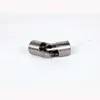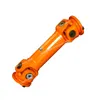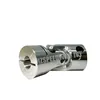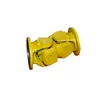"For Heavy Duty" refers to products engineered to withstand extreme conditions, high stress, and prolonged use in demanding environments. These items are built with superior materials and robust designs to ensure longevity, reliability, and peak performance under heavy loads or intense operations. Common applications include industrial machinery, construction equipment, automotive parts, and more, where standard products might fail. When you choose For Heavy Duty solutions, you're investing in durability, safety, and efficiency for critical tasks.
Our For Heavy Duty product line is meticulously designed with specifications that meet rigorous standards. Below is a detailed breakdown of parameters in list and table formats for clarity.
| Parameter | Value | Unit | Description |
|---|---|---|---|
| Load Capacity | Up to 10,000 | kg | Maximum weight the product can handle without failure. |
| Operating Temperature | -40 to 150 | °C | Range within which the product maintains optimal performance. |
| Durability Lifecycle | 50,000+ | hours | Estimated service life under continuous heavy use. |
| Power Consumption | 220-240 | V | Standard voltage requirement for electrical components. |
| Weight | Varies by model (e.g., 15-100) | kg | Product weight, designed for balance and portability. |
For Heavy Duty items are versatile and essential across various sectors. Here are common use cases:
What does "For Heavy Duty" mean in product context?
It indicates that the product is designed for demanding applications, offering enhanced strength, durability, and performance compared to standard versions. These products undergo rigorous testing to ensure they can handle extreme conditions, such as high loads, temperature variations, and prolonged use, making them ideal for industrial, commercial, or heavy-use scenarios.
How do I know if a product is truly For Heavy Duty?
Look for certifications like ISO standards, detailed technical specifications (e.g., load capacity, material grades), and manufacturer testing data. Genuine For Heavy Duty products often include warranties, performance guarantees, and clear documentation of their design features, such as reinforced structures or specialized coatings. Always verify with the supplier for compliance with industry norms.
What are the maintenance requirements for For Heavy Duty equipment?
Regular maintenance is crucial and typically includes periodic inspections for wear and tear, lubrication of moving parts, and calibration of sensors. Follow the manufacturer's guidelines, which might suggest service intervals every 500 hours of use or based on environmental factors. Use recommended cleaning agents and store products in dry, cool conditions to prevent corrosion and extend lifespan.
Can For Heavy Duty products be used in all weather conditions?
Yes, most are built to operate in a wide range of environments, from freezing cold to extreme heat, as specified in their operating temperature parameters. However, always check the product manual for limitations, such as exposure to saltwater or chemicals, which might require additional protections. Proper installation and occasional weatherproofing can enhance performance in adverse conditions.
Are there customization options available for For Heavy Duty items?
Many manufacturers offer customization to meet specific needs, such as altered dimensions, special coatings, or integrated technology. Discuss your requirements with the provider, who can tailor products based on load demands, environmental factors, or compatibility with existing systems. Custom options may affect lead times and costs but ensure optimal fit for your application.
How does For Heavy Duty compare to industrial-grade products?
For Heavy Duty is often synonymous with industrial-grade, implying high robustness and reliability. However, "industrial-grade" might refer to a broader category, while For Heavy Duty specifically emphasizes capacity for heavy loads and stress. Both prioritize durability, but For Heavy Duty products are typically tested for maximum performance under the most strenuous conditions, making them a subset of industrial solutions.
What safety precautions should I take when using For Heavy Duty equipment?
Always wear appropriate personal protective equipment (PPE), such as gloves and helmets, during operation. Ensure proper training for users, follow load limits strictly, and implement regular safety checks. Install guards or safety interlocks if provided, and keep emergency protocols handy. Refer to the product's safety manual and comply with local occupational health regulations to prevent accidents.
Is there a warranty for For Heavy Duty products?
Yes, most come with a warranty that covers defects in materials and workmanship, typically ranging from 1 to 5 years depending on the product and manufacturer. Warranty terms often require proper use and maintenance; review the documentation for details on coverage, claim procedures, and exclusions such as misuse or unauthorized modifications.





